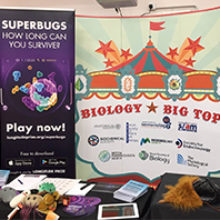Outreach: Big Biology Day & New Scientist Live
Issue: Halting Epidemics
07 February 2017 article

Big Biology Day
The Microbiology Society attended Big Biology Day Cambridge, an annual event that attracted over 2,000 families, hosting a lunchtime panel discussion on the human microbiome and exhibiting its Antibiotics Unearthed project.
Human microbiome panel discussion
The Society ran a panel discussion attended by over 40 members of the public about the microbes that live in and on you, known as the human microbiome. The panel included Dr Marc-Emmanuel Dumas from Imperial College London, Dr Hilary Browne from the Sanger Institute, Cambridge, and Dr Michelle Beaumount from King’s College London.
After short presentations from the speakers, the audience asked their questions. Areas of intrigue included whether the microbiome changes as we age, whether any probiotic drinks are in clinical trials, and who first decided to try faecal transplants.
The Microbiology Society has identified the microbiome as a growing area in the public consciousness, and this event is part of our efforts to engage people about the potential benefits of this area of research and the challenges it may need to overcome.
Visit our blog, Microbe Post, for more information about the microbiome event.
Antibiotics Unearthed
The Antibiotics Unearthed Team attended Big Biology Day Cambridge, as part of the Biology Big Top, to engage with the public about antimicrobial resistance (AMR). The Biology Big Top is a joint touring stand with other biological learned societies and in Cambridge we presented alongside the Biochemical Society, Royal Society of Biology and NESTA. The Team encouraged participants to use microscopes to examine plates containing the soil-dwelling microbes, Streptomyces (kindly provided by Dr Paul Hoskisson, University of Strathclyde), to see if they could spot any antibiotic-producing bacteria. Find out more about Antibiotics Unearthed on our website.
Many people who visited the stand were aware of antibiotic resistance but did not know that a large number of current antibiotics are derived from soil-dwelling bacteria. Visitors had lots of questions about why AMR is becoming a problem and ideas about alternative solutions, such as reducing environmental usage of antibiotics. Several attendees are taking part in the citizen science part of the project and have sent in soil samples to be tested by Ethan Drury, our PhD student at University of East Anglia, for antibiotic activity.
The Antibiotics Unearthed Team and the Biology Big Top will be visiting events throughout 2017 so keep a look-out for one near you.
Andrew Day
Public Affairs Intern
Hannah Forrest
Public Engagement Officer
[email protected]
New Scientist Live
In September, the ExCeL arena in London hosted New Scientist Live, a huge festival of science and technology. During the event, the Microbiology Society collaborated with the Biochemical Society to organise a panel discussion about the problem of antimicrobial resistance entitled ‘When A Scratch Can Kill’.
The panel was made up of: Anthony McDonnell from the Review on Antimicrobial Resistance; Tamar Ghosh from the Longitude Prize; Dr Caroline Barker, a consultant microbiologist; and Professor Laura Bowater from Norwich Medical School. Anthony reinforced public health messages discouraging unnecessary use of antibiotics, as this is an important driver of resistance. In a recent survey, over a third of young people didn’t know that antibiotics are only effective against bacteria. Tamar highlighted the Superbugs game, a mobile app developed by the Longitude Prize to combat this problem by engaging young people and educating them about AMR.
Despite the warnings given by all the speakers, Dr Barker remained hopeful, referencing the many public health measures, such as sanitation and immunisation, that have reduced the burden of killer diseases like diphtheria and whooping cough in the past. The message from the panel was that AMR is a global problem and we are part of the solution. Professor Bowater concluded the discussion by telling the audience that the solution to AMR was “in your hands”.
Listen to our podcast from the event and view our videos on the Society YouTube channel.
